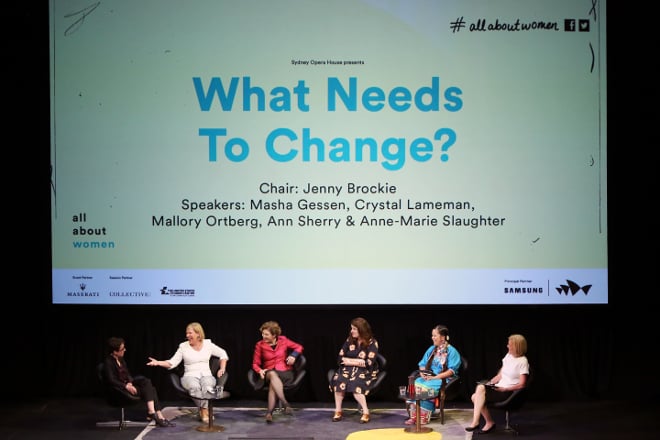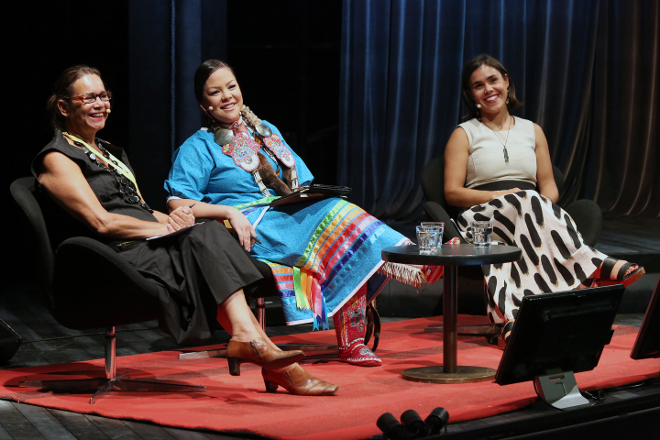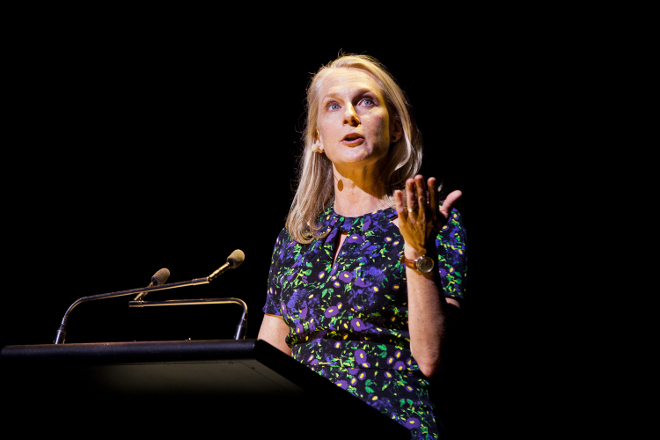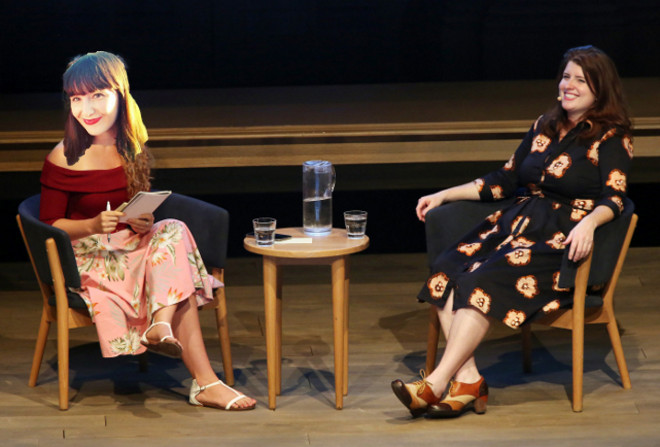Six Great Lessons From Your Favourite Ladies At All About Women 2016
Take stages, build new creative space, and arm-wrestle as many men as humanly possible.

Happy International Women’s Day, friends! Or, as it has come to be known by our kind, International ‘But When Is Men’s Day?’ Day.
On International Women's Day you can kick a man in the shins and you won't get charged for assault thats the law
— Saint Bhakthi (@bhakthi) March 7, 2016
If you are one of the many women currently fending off angry Facebook comments from that guy you knew from high school who never shook the stink of Lynx Africa, or getting in an awkward debate with your well-paid male colleague about how “you know, the pay gap isn’t actually a thing anymore”, I wish you strength and also offer temporary solace.
Here’s a full report from this Sunday’s fourth annual All About Women festival at the Sydney Opera House. The event consisted of a full day of talks exclusively by women on issues which affect women, and no one was called a ‘feminazi’ once. Crazy, I know, but just go with it. Here’s what the great speakers had to say:
–
Miranda July: There’s Always A Fresh Way Of Doing Something
Miranda July has always been a bit odd. That, if you weren’t really paying attention, would be the overarching theme of the artist and filmmaker’s (nationally and internationally touring) talk Lost Child! which kicked off the day’s sessions.
Over the course of 90 minutes in one of the Opera House’s largest venues, July charted her career from a little girl doing doodles of odd children being beamed into space, to a teenager making pen pals with grown men convicted of murder, to a young woman supporting her art as a stripper and professional car door unlocker, to an emerging auteur making “live movies” by herself in the back rooms of pubs, to an internationally acclaimed filmmaker, artist and author.
Considering both her larger reputation as a whimsical skittish forest elk and impressive outfit choices on the day, it would be easy to take all that as face value. It’s pretty weird.
Miranda July is wearing a neon purple leopard print onesie and an orange cardigan. All is right #allaboutwomen
— Meg Watson (@msmegwatson) March 5, 2016
But, as she spoke about how each of those experiences was deliberately either undertaken or utilised to serve the evolution of her creative practice, they became much less ridiculous.
“You need to create new space for yourself,” July said with a considered and measured emphasis on each word. “Create new water and air.” She recalled how the little games she played in an impulsive relationship with a woman from Portland led to the start of online participative art project Learning To Love You More. Mailing videos to women all over the country, she created “a clunky feminist YouTube” years before YouTube existed. A snap decision to meet people selling things in the Penny Saver led to a friendship with an elderly man she called her “muse”; she used his artwork on the cover of her book, It Chooses You.
Though much of this can be chalked up to a sheer passion for originality, it’s also not divorced from her experience of gender. Her first film was only greenlit because a female producer had seen one of her “live movies”. She saw her filmmaking career play out against those of successful men she saw as “boring” and actively avoided. Her new life as a mother inspired some of the best work she’d ever created.
Whether you have any interest in courting strangers from the classifieds or not, this is just some excellent advice to live by:
"I continue to forget and remember and forget and remember and forget and remember that I'm free" – Miranda July #AllAboutWomen
— Meg Watson (@msmegwatson) March 6, 2016
–
Crystal Lameman: There’s No One Mission Of Feminism
One of the day’s most interesting sessions was also its most impossible. It featured LGBT activist and Russian dissident Masha Gessen, climate justice campaigner and Indigenous woman of the Beaver Lake Cree Nation in Canada Crystal Lameman, The Toast editor Mallory Ortberg, businessperson Ann Sherry, US political scientist Anne-Marie Slaughter, and Walkley Award-winning journalist Jenny Brockie. And, together, they took on the topic of ‘What Needs To Change’.
Though Brockie acknowledged the difficulties of the absurdly broad question and made valiant efforts to guide the conversation regardless, the topics shifted wildly. Putin’s Russia and its wilful abuse of the queer population could do with some tweaks. Wage equality and gender parity in parliament are a few things we could get ’round to. It would be peachy if Australian women weren’t being murdered and abused at epidemic rates.
“Working for the impossible is what we all do, right?” Gessen said at one particularly bleak part of the overwhelmingly distressing conversation.
There were of course some helpful ideas thrown around, but when discussion shifted towards society’s conceptions of family and motherhood, a few stark divides emerged. Sherry and Slaughter agreed “the assumption that care is a woman’s job is locking us into permanent inequality”. Women shouldn’t be expected to stay home, or be ‘domestic’, or be seen as the automatic caretaker.
Gessen was however more sceptical of the nuclear, heteronormative assumptions at play.
“My family at the moment consists of me, my partner, my ex-partner, our three kids, the male nanny who’s lived with us for years, the couple of refugees from St Petersburg with their daughter — and I’m the primary breadwinner for that setup … It’s not enough to stop raising girls to be ‘wives’, let’s not raise children to live in an impossible setup. A marriage with children and no one else involved is not a workable model.”
Crystal Lameman’s insights went even further. “My story is different than yours,” she said. “Don’t get offended. “Our role in a matriarchal society is different for us Indigenous women. Our ways of knowing are drastically different from all your stories. We’re raised to be caregivers because, as women, we’re raised with an understanding that Mother Earth is our one true mother. Just as Mother Earth provides… us, as women, it’s our responsibility to do that as well.
“As a woman in a marriage, I had to make a hard decision,” she continued tearfully. “I had to choose to leave and speak for my children, or stay in an abusive marriage and get my ass kicked all the time. I chose to leave… I had to make a choice to be a single mum. I have a boy that I have to raise to know how to treat women. I have a daughter, I have a responsibility to show her what she deserves. As an Indigenous woman, it’s my role to be a caregiver.”
–
Mallory Ortberg: Intersectionality Is Key
Though she jokingly protested about her inclusion, the US writer and person I would like to adopt as a sassy big sister was a similarly refreshing voice on this same panel. As much of this debate took off on either side of her, she issued some bold and clear-sighted input:
What needs to change? Well, some elements of feminism itself.
Mallory Ortberg: "white feminism is about pulling up the ladder after yourself and saying 'glad we got that done'" #AllAboutWomen
— Meg Watson (@msmegwatson) March 6, 2016
Speaking about the emergence of small tensions between second and third wave thinking on stage, Ortberg pointed out that this is a crucial moment in which the global conversation needs to expand. We should acknowledge the efforts of those who’ve come before us and then actively include those who weren’t heard in the first place (such as queer women and women of colour).
Following an anecdote Sherry told about being asked routinely offensive gendered questions at a tennis club, Ortberg said: “it’s time to listen to those who weren’t invited to the club in the first place”.
Mallory: It's interesting that we have the word 'intersectional'. We have to specify it's not dominated by white supremacy #AllAboutWomen
— Meg Watson (@msmegwatson) March 6, 2016
–
Some Legends In The Crowd: Indigenous Women Need Way More Platforms
At the end of this session — and I will move on at some point, but hey it was a lot to get through — Crystal Lameman asked that the last question be given to two Aboriginal women up the back of the venue. Then, because the session’s chair Jenny Brockie hadn’t done it, they gave an acknowledgement of country and directed a question back to Lameman: how did she feel being the only person of colour on the panel?
“This panel’s about what needs to change, but really that’s what needs to change about this panel itself,” they said. The whole venue broke out in applause.
“That same question has been lingering in the back of my mind since I walked in here last night: where are the original people of this territory?” Lameman responded.
Lameman: "As an indigenous woman, I had to go and study western academia and get a bunch of letters after my name to be heard #AllAboutWomen
— Meg Watson (@msmegwatson) March 6, 2016
“I am given this responsibility to do this work for my Mother [Earth] … All I can do is do my best to speak for each and every one of us; to speak those next generations, and those ones that fought and died for us.”
This is actually a topic that came up in the previous hour in which Lameman sat on a panel of exclusively Indigenous women. During ‘We Belong To The Land’, both Lameman and Bundjalung woman Amelia Telford spoke of their work as climate justice campaigners and explained the routinely overlooked connection Indigenous people can have to a nation’s land. Both women explained the hardship their communities face and their inability to be heard by governments and corporations. As they stepped up to speak at the podium, both Lameman and Telford cried.
As chair of the panel, Indigenous Programming Rhoda Roberts offered great support by blowing kisses and giving spot-on insight like this:
"Aboriginal people are born with obligation… We say it's a privilege, but it's a huge load." – Rhoda Roberts #allaboutwomen
— Meg Watson (@msmegwatson) March 6, 2016
These three (alongside Ruby Hamad and Hyeonseo Lee) were among the few women of colour featured in the festival lineup.
–
Piper Kerman: Women Can Ensure Each Other’s Survival
Those who came to Piper Kerman’s talk expecting her to dish about the real-life Alex or Crazy Eyes may have been disappointed, but only momentarily — what came instead was an incredibly knowledgeable and infinitely more important address on the state of women’s incarceration. “The US has 5 percent of the world’s population, and 25 percent of the world’s prisoners,” she said. “One out of every three women incarcerated globally are in the US … [They’re] incarcerating 650 percent more women than a few decades ago.”
Kerman: The title OITNB is in reference to the fact prisoners are likely to be women now more than ever #AllAboutWomen
— Meg Watson (@msmegwatson) March 6, 2016
Kerman puts this down to a few things. The nation has always had an exorbitant demand for ‘justice’ and this has escalated in recent years when it comes to relatively small-fry crimes around drugs. But it also stems from an inability to understand what brings people to these things in the first place.
“Prisons are society’s ultimate tools of marginalisation,” she said. “They’re also full of people who’ve always experienced that. As high as 90 percent of incarcerated women have already been marginalised [whether that’s through mental health problems, substance abuse, or sexual/physical abuse] well before being locked up. If we better looked out for them in the community, we’ll be way less reliant on the prison system than we are now.”
That being said, while we’re working in this authoritative, highly patriarchal system — she also ominously stated that “every prison has a Pornstache” — it may be up to us to do the best for one another. Speaking of a life-long friend she made with a fellow prisoner called Pom Pom and the women who consistently offered her unexpected kindness while serving her time, Kerman said: “Inequality becomes intolerable when you allow yourself to be truly connected to others”.
–
Mallory Ortberg: Feminism Is A Very Old Dog That Is Spry In The Morning But Very Sleepy In The Evening
Mallory Ortberg said many great things during her one-hour talk ‘The Happy Feminist’ alongside Australian comedian Alice Fraser. She noted women shouldn’t be forced to talk about feminism one way or the other. If they’re angry, they should go for it. If they’d rather crack a joke, that’s fine too. Sometimes the latter can be great — it can slip through the cracks of defences held by people who’ve heard an argument one too many times before.
She also kinda jokingly (kinda not) suggested feminism could be called “women’s lib” again. We could bring it back and call all our favourite gals “libbers” like old-timey factory workers just learning what women’s suffrage is. Our mascot could be called Libby and she’d look like Libby from Sabrina The Teenage Witch.
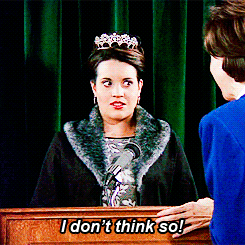
But the best thing about her talk may have in fact been the way she gave it. Ortberg compared being a woman to that ‘Treehouse of Horror’ episode where Bart could read minds and everyone had to walk around with freakish constant smiles. When talking about any perceived animosity between women and men, she jokingly (again, kinda not) said she’d fight any man in the room and started boasting about how great at arm wrestling she was. Then, she very matter-of-factly declared feminism “an old, still-fragrant pear held by a maiden aunt” and “a ship named intersectionality that is full of non-exotic spices and silks sailing into harbour”.
Incredible truths from @mallelis #AllAboutWomen pic.twitter.com/r89pkCbxPH
— Meg Watson (@msmegwatson) March 6, 2016
Ortberg’s blend of cynical sarcasm and optimistic absurdity is one most of us can relate to: it’s become a great state of mind for those who would like to face serious problems head-on and not die at 32, bleeding out through their nose from constant anger-induced anxiety attacks. It may even be the best way to enjoy women’s conferences: a respectful acknowledgement of their importance and love for the community they bring, lightly salted with some satire around the fact they’re still so necessary in the first place.
–
